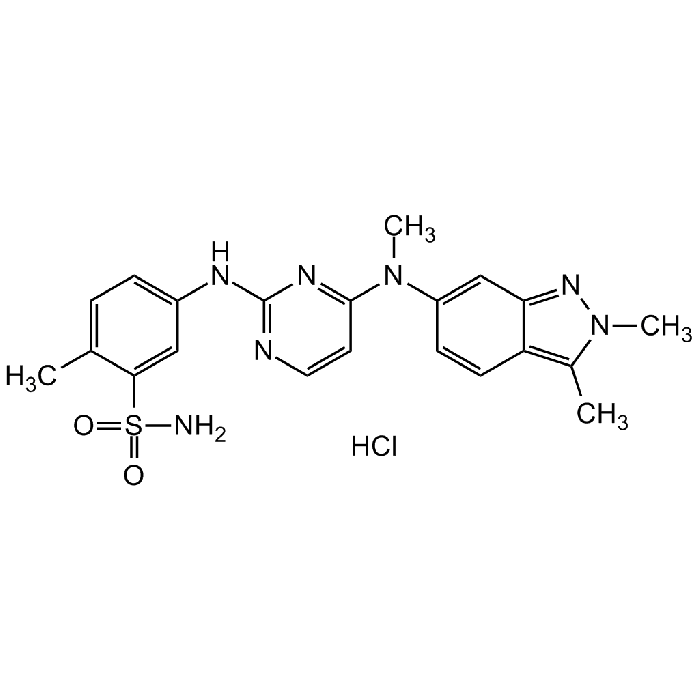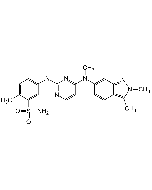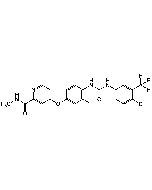Cookie Policy: This site uses cookies to improve your experience. You can find out more about our use of cookies in our Privacy Policy. By continuing to browse this site you agree to our use of cookies.
AdipoGen Life Sciences
Pazopanib . hydrochloride
As low as
45
CHF
CHF 45.00
In stock
Only %1 left
AG-CR1-3748-M01010 mgCHF 45.00
AG-CR1-3748-M05050 mgCHF 95.00
AG-CR1-3748-M250250 mgCHF 280.00

| Product Details | |
|---|---|
| Synonyms | GW-786034; GW786034B; GSK-VEG10003; Votrient; Armala |
| Product Type | Chemical |
| Properties | |
| Formula |
C21H23N7O2S . HCl |
| MW | 437.5 . 36.5 |
| CAS | 635702-64-6 |
| RTECS | DB2356200 |
| Purity Chemicals | ≥98% (HPLC) |
| Appearance | White to off-white solid. |
| Solubility | Soluble in DMSO (10mg/ml). Insoluble in water. |
| Identity | Determined by 1H-NMR. |
| InChi Key | MQHIQUBXFFAOMK-UHFFFAOYSA-N |
| Smiles | CC(C(S(=O)(N)=O)=C1)=CC=C1NC2=NC=CC(N(C)C3=CC4=NN(C)C(C)=C4C=C3)=N2.Cl |
| Shipping and Handling | |
| Shipping | AMBIENT |
| Short Term Storage | +4°C |
| Long Term Storage | -20°C |
| Handling Advice | Keep cool and dry. |
| Use/Stability | Stable for at least 2 years after receipt when stored at -20°C. |
| Documents | |
| MSDS |
 Download PDF Download PDF |
| Product Specification Sheet | |
| Datasheet |
 Download PDF Download PDF |
Description
- Pazopanib is a potent and selective multi-targeted receptor tyrosine kinase inhibitor. It is an orally available angiogenesis inhibitor targeting vascular endothelial growth factor receptor (VEGFR), platelet-derived growth factor receptor (PDGFR) and c-kit. It inhibits the VEGF receptors VEGFR1, VEGFR2 and VEGFR3 (IC50s = 10, 30 and 47 nM, respectively, in a cell-free enzyme assay) and also inhibits PDGFR, FGFR, c-Kit and c-fms with IC50 values of 84nM, 74nM, 140nM and 146nM, respectively, all key proteins responsible for tumor growth and angiogenesis.
- Pazopanib is an anti-tumor and anti-angiogenic agent. It inhibits upregulation of the surface adhesion proteins ICAM-1 and VCAM-1 induced by VEGF in multiple myeloma cells co-cultured with human umbilical vein endothelial cells (HUVECs) and decreases multiple myeloma cell adhesion to HUVECs. It also inhibits proliferation of multiple myeloma cells co-cultured with HUVECs. Pazopanib reduces tumor growth, induces apoptosis, decreases angiogenesis and increases survival in vivo in multiple myeloma mouse xenograft model. Formulations containing pazopanib have been used in the treatment of cancer.
Product References
- The small-molecule VEGF receptor inhibitor pazopanib (GW786034B) targets both tumor and endothelial cells in multiple myeloma: K. Podar, et al.; PNAS 103, (2006)
- Pharmacokinetic-pharmacodynamic correlation from mouse to human with pazopanib, a multikinase angiogenesis inhibitor with potent antitumor and antiangiogenic activity: R. Kumar, et al.; Mol. Cancer Ther. 6, 2012 (2007)
- Pazopanib: a novel multitargeted tyrosine kinase inhibitor: G. Sonpavde & T.E. Hutson; Curr. Oncol. Rep. 9, 115 (2007) (Review)
- Pazopanib, a VEGF receptor tyrosine kinase inhibitor for cancer therapy: B. Sloan & N.S Scheinfeld; Curr. Opin. Investig. Drugs 9, 1324 (2008) (Review)
- Suppression and regression of choroidal neovascularization by the multitargeted kinase inhibitor pazopanib: K. Takahashi, et al.; Arch. Ophthalmol. 127, 494 (2009)
- Pazopanib for the treatment of renal cell carcinoma and other malignancies: G. Sonpavde, et al.; Drugs Today 45, 651 (2009) (Review)
- Pazopanib: the newest tyrosine kinase inhibitor for the treatment of advanced or metastatic renal cell carcinoma: S.V. Keisner & S.R. Shah; Drugs 71, 443 (2011) (Review)
- Pazopanib a tyrosine kinase inhibitor with strong anti-angiogenetic activity: a new treatment for metastatic soft tissue sarcoma: G. Ranieri, et al.; Crit. Rev. Oncol. Hematol. 89, 322 (2014) (Review)










